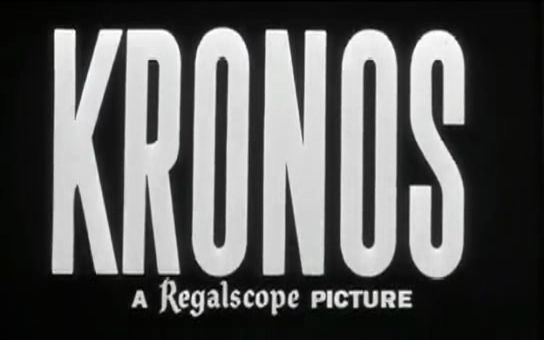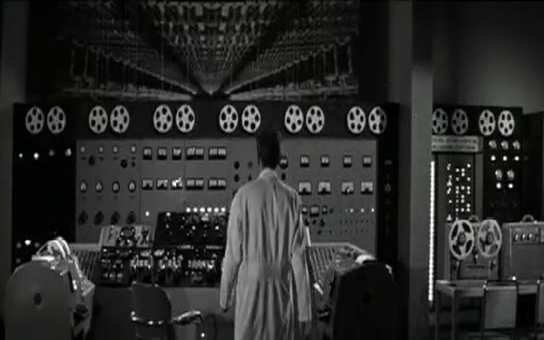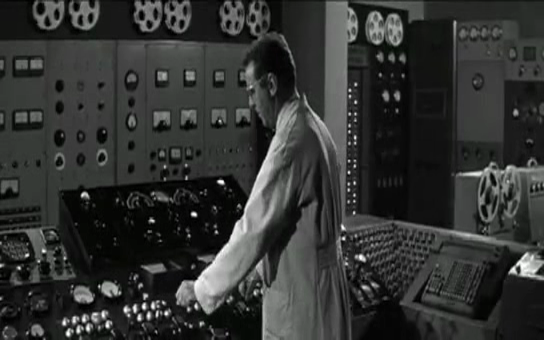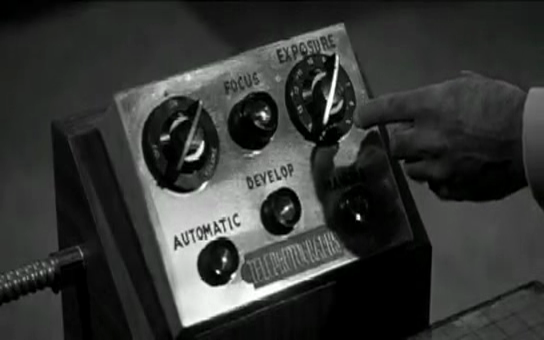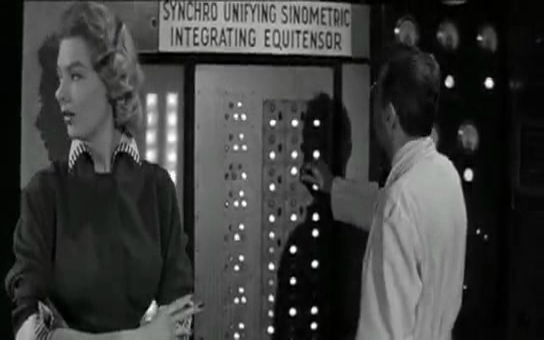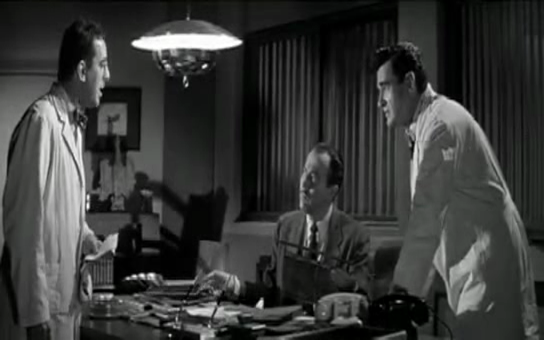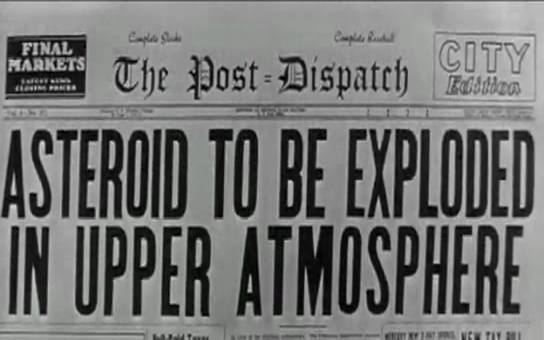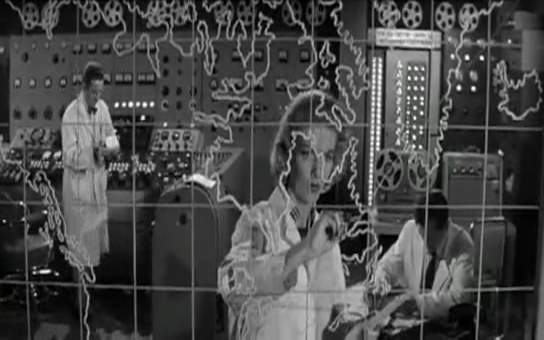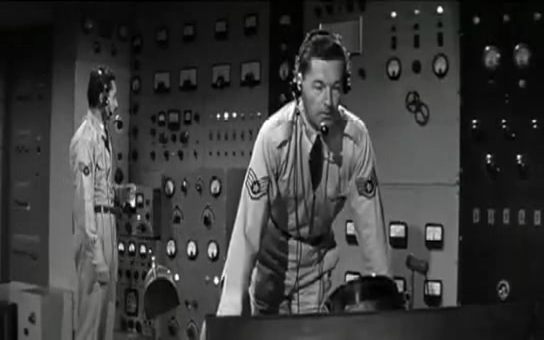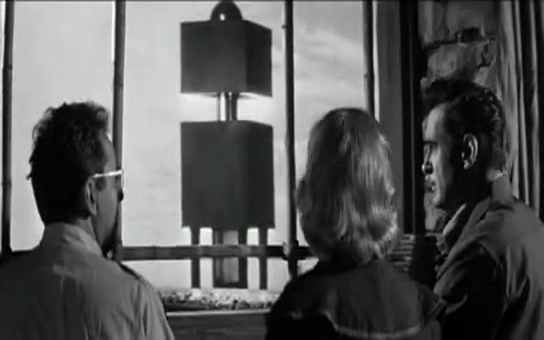-
#10 – Kronos (1957)
Kronos (1957)
Film review #10
dir. Kurt Neumann
An old B-movie sci-fi from the 1950s. Kronos is not very well known, but has some interesting aspects to it.
When a strange asteroid is spotted in space, two scientists at Lab Central try to work out it’s origins. When it makes unnatural movements and deviations from it’s course, Dr Leslie Gaskell and Dr. Arnold Kulver suspect there may be something more to it. At the same time, a strange spark of light has taken possession of the Labs director: Dr. Hubbard Elliot. The asteroid continues on a collision course with Earth and panic spreads across North America, fearing it will crash onto a city. These fears are unfounded, when it crashes into the Pacific Ocean, near Mexico.
The scientists, along with Vera Hunter go to Mexico to investigate, and while they’re there, a strange construct appears. This “monster” (named Kronos by Gaskell, after the monster of Greek mythology), proceeds to march upon a power station to absorb it’s energy. Dr. Elliot is fighting the influence of the alien intelligence intermittently, and after Kronos absorbs the energy of a H-bomb, he regains control of himself to reveal the purpose of Kronos: To drain the planet of all it’s energy. In a race against time to stop Kronos from reaching the atomic weapons facility and its nearly unlimited energy, Leslie and Arnold engineer a plan to reverse the charge of Kronos’s energy convertors, effectively destroying itself.
The plot may seem a bit confusing, but it addresses issues such as energy consumption before many other films or TV series did. The science of the movie moves between factual and fictional rather seamlessly, making it hard to pinpoint where the real end science ends, and the fictional science begins. This, however, is probably a good thing for movies such as this, which are released onto a general public that really isn’t that clued in on science, namely the American movie-goers of the 1950s.
On that subject, the movie is very much an American movie. Movie staples such as the spinning newspapers aid the transition of science into the cinema mainstream. A sound move perhaps, since movies in the same genre from the 50’s, such as The Day The Earth Stood Still don’t rely much on the technical science, and generally put an alien or scientific spin on common human dramas, which is not the case for Kronos.
The main characters are very much the same as every other movie character at that time in America, with a little cowboy attitude, and the relationship between Leslie and Vera, which seems very normal, talking about going to the movie themselves, and frolicking on the beach. Perhaps this humanises the notion of what sort of person a scientist is, as their perception at this time would be of someone who develops weapons of mass destruction, rather than someone who furthers knowledge and understanding. The character of Dr. Arnold Kulver probably fits the traditional scientist model more so, with his glasses, and bow tie, and how he seems to have more of a relationship with the computer SUSIE than an actual woman. He plays more of a “sidekick” role, which fits with a lot of American drama at the time, putting the role of the “brainbox” as the assistant, and never as the star. Though Leslie is a scientist too, he rarely plays to the traditional convention of one like Arnold does.
Apparently, the entire movie was filmed in just two weeks. Which seems rather quick even for the 1950s. There is a lot of stock footage, and there are only a few actual locations/sets used, and the special effects are quite underwhelming. Lab Central has a very postmodern look to it, with its dome lighting and physic models, and a rather impressive looking computer called SUSIE (short for Synchro Unifying Sinometric Integrating Equitensor…sounds either very complex or just nonsense depending on your perspective). This computer may look rather grand and complex, but its function could probably be accomplished now using a computer about a tenth of its size. Back when it was produced though, when people had no concept of personal computers, this is what computers would have been recognised as: Large sets of blinking lights and switches that occupy entire rooms.
There’s a small religious reference in this movie. When the scientists go to Mexico, they stay with a man who (though he speaks entirely Mexican), is clearly religious, with a cross on the wall, and who kisses the cross on his neck when Kronos appears. It seems science-fiction movies from this era always find a way to shoehorn religion in their movies somewhere. Like The Day The Earth Stood Still as well, it addresses the danger of atomic weapons, though not in their destructive power, but how they feed Kronos to make it more powerful.
So while nothing particularly special in terms of production, Kronos offers a view of the perception of science in the 1950s. The plot is riddled with scientific jargon, and the plot requires some deduction since it isn’t explained until very late on. A disaster movie that is powered by, and eventually stopped by science.
